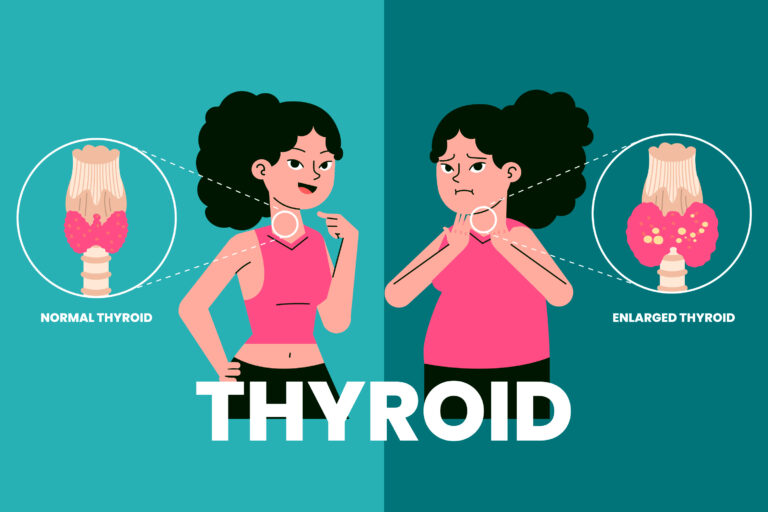Hypothyroidism: An easy way to improve it
This complete guide to hypothyroidism covers types, risk factors, clinical signs, treatment options, and nursing interventions.

Definition of Hypothyroidism
Hypothyroidism means your thyroid gland is underactive. It doesn’t make enough thyroid hormones, which slows down your body’s metabolism and heat production.
Types of Hypothyroidism
- Primary Hypothyroidism (most common)
- Happens when the thyroid gland is damaged.
- Causes include:
- Cretinism (since birth)
- Iodine deficiency
- Certain medicines
- Radiation
- Defective hormone production
- Causes include:
- Secondary Hypothyroidism
- The pituitary gland fails to signal the thyroid.
- Tertiary Hypothyroidism
- The hypothalamus doesn’t release TRH due to brain tumors or damage.
- Subclinical Hypothyroidism
- TSH is high, but T4 level is still normal.
Causes (Aetiology) of Hypothyroidism
- Autoimmune disease (like Hashimoto’s)
- Congenital issues
- Pituitary gland problems
- During or after pregnancy
- Iodine metabolism problems
- Radiation for neck or thyroid issues
- Side effects from certain drugs like lithium
Risk Factors
You’re more likely to get hypothyroidism if you:
- Are female
- Are older
- Are white or Asian
- Have a family history of thyroid or autoimmune diseases
- Are pregnant or recently gave birth
- Had thyroid surgery
- Take certain medications
Pathophysiology (What Happens Inside)
- The thyroid, pituitary, and hypothalamus work together to regulate thyroid hormone.
- If the thyroid can’t produce T3, T4, and calcitonin, your metabolism slows down.
- The body tries to fix this by making more TSH, which causes the thyroid to grow — leading to goiter.
- If severe, it causes myxedema (swelling, puffy face, dry skin).
Signs and Symptoms (System-Wise)
- Blood:
- Easy bruising
- Mild anemia
- Cardiovascular:
- Slower heart rate
- Slightly high BP
- Digestive:
- Poor appetite
- Weight gain
- Constipation
- High cholesterol
- Urinary:
- Water retention
- Less urine
- Decreased red blood cell production
- Respiratory:
- Shortness of breath
- Weak breathing muscles
- Skin, Hair & Nails:
- Dry, rough skin
- Hair loss
- Brittle nails
- Cold intolerance
- Digestive:
- Poor appetite
- Weight gain
- Constipation
- High cholesterol
- Muscles & Bones:
- Cramps, stiffness
- Slow movements
- Bone pain
- Nervous System:
- Slowed reflexes
- Tiredness
- Slow speech
- Reproductive:
- Women: Heavy or irregular periods
- Men: Low sex drive
Diagnosis
Doctors may perform:
- Physical exam and medical history
- Blood tests:
- TSH: High levels = hypothyroidism
- T4: Low levels confirm the diagnosis
- RAIU (Radioactive Iodine Uptake Test)
- ECG: For heart changes
- Needle biopsy: To rule out cancer
Treatment and Management
- Medical Treatment
- Goal: Keep thyroid hormone levels normal for life.
- Hormone replacement:
- Levothyroxine (T4) – most common and safest
- Thyroid extract (T3 + T4) – more side effects
Note: Hormone dose is adjusted monthly based on TSH levels.
- Surgery
- For large goiters pressing on the windpipe
- Needle biopsy if cancer is suspected
- Non-Medical Care
- Rest and emotional support
- High-fiber diet
- Regular bowel care
- Weight loss plan
Complications of Hypothyroidism
- Trouble breathing or swallowing due to goiter
- Infertility
- Myxedema (life-threatening if untreated)
Nursing Management
- Energy support: Help with daily tasks as patient gets tired easily.
- Monitor vitals: Watch for heart, breathing, or mental changes.
- Keep warm: Use blankets but avoid heating pads.
- Emotional care: Support patient’s body image and mental health.
- Educate family: Explain the disease and care needs.
- Teach self-care: Include medicine schedule, side effects, and follow-ups.
- Diet advice: Focus on weight control and fiber intake.
- Take precautions: Be careful with other medications and watch for side effects like high blood sugar or breathing problems.
Conclusion
Hypothyroidism is a condition where the thyroid gland does not make enough thyroid hormones. These hormones are essential for regulating the body’s metabolism, energy levels, and many vital functions. When hormone levels are low, body processes slow down, leading to symptoms such as tiredness, weight gain, cold intolerance, constipation, and dry skin.
If diagnosed early and treated properly with thyroid hormone replacement (usually levothyroxine), most people with hypothyroidism can live healthy, normal lives. Regular monitoring, proper medication, and healthy lifestyle choices are key to effective management.
In short:
With the right treatment and care, hypothyroidism is a manageable condition and patients can lead a full and active life.
YOU CAN ALSO READ-


It’s really helpful